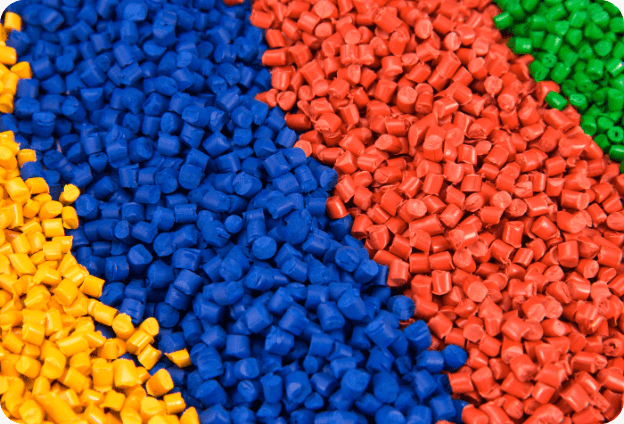Going with the Flow: What You Need to Know About Melt Flow Testing for Thermoplastics

It’s been said that necessity is the mother of invention. So, it’s no surprise that World War II became a catalyst for the modern plastic industry. For example, when the silk stockings traditionally worn by women in the 1940s were no longer readily available, synthetic nylon stockings became the go-to garment.
Today, plastics are ubiquitous in every area of our lives — from cars and consumer products to clothes and carpeting.
Over the years, the use of plastics grew exponentially as a way to reduce the cost, and in some cases, the weight of certain products. For example, the automotive industry’s “lightweighting” efforts rely heavily on plastics to reduce vehicle weight and thus improve fuel efficiency.
What Are Thermoplastics & Polymers?
Made primarily from petroleum or natural gas, thermoplastics are materials with the convenient and unique ability to be melted, formed, and reshaped into an endless array of products.
Thermoplastics are a type of polymer, which are made from long chains (repeating units) of small molecules known as monomers. A single polymer chain could contain hundreds, or even thousands, of links. Unlike short molecules, long molecular chains are typically associated with physical qualities such as strength and toughness.
Determining a polymer's Melt Flow Index (MFI), is helpful for plastic processors and manufacturers because it reflects the melt viscosity of the polymer, which speaks to the material’s processability.
What is Melt Flow Rate/Index?
When you need to better understand the flow properties of a thermoplastic, melt flow index can help. In essence, MFI measures how easily a melted polymer flows.
A type of materials property test, MFI testing, also known as Melt Flow Rate (MFR) testing measures the flow rate of the melted thermoplastic material and, thus, provides valuable insight into how easily it can be processed.
The MFI Testing Process
Melt flow index testing is a fairly simple test. Here’s how it works:
- A polymer sample is heated to a specific temperature in the barrel of a melt flow index tester, also known as an extrusion plastometer.
- A weight is applied to a piston, which pushes the melted plastic in the barrel through a die.
- After a specified amount of time, the extruded polymer is cut and weighed to determine the MFI/MFR. The MFI/MFR measurement is reported in grams of polymer per 10 minutes (g/10 mins).
- The test is usually performed in triplicate.
The higher the MFI, the faster the flow. Along with melt flow rate, testing can also quantify melt volume flow rate (MVR), which is expressed as cm3/10 mins.
Global Standards for MFI Testing
There are two primary global standards that help to ensure consistency, accuracy and reliability in MFI testing around the world. Each standard specifies the testing equipment, methods and conditions to be used in MFI testing.
- ASTM D1238: Standard Test Method for Melt Flow Rates of Thermoplastics by Extrusion Plastometer
Published by the American Society for Testing and Materials (ASTM), this standard is most often used in North America and other regions that follow ASTM standards.
- ISO 1133-1:2022; Plastics: Determination of the melt mass-flow rate (MFR) and melt volume-flow rate (MVR) of thermoplastics
Published by the International Organization for Standardization (ISO), this standard is commonly used in Europe and other regions following ISO standards.
These international standards help to ensure that MFI testing is accurate and consistent, regardless of where it is performed. Customer preferences and location may dictate which standard is used.
Whether melt flow index testing is conducted in-house or by an independent laboratory, it is important that the specific test parameters such as conditioning, weight, and temperature, are reported in detail.
Applications & Benefits of MFI Testing
For manufacturers and researchers working with thermoplastics, MFI is a valuable and versatile tool for quality control, material selection and research and development.
The melt flow index test can quickly provide insight into the physical properties of the thermoplastic, and thus, how suitable it is for a particular application.
Here are just a few of many helpful applications for melt flow index testing:
- To predict a polymer’s processability and determine optimal processing conditions
- To aid in material selection during product development
- Can indirectly provide information about a polymer’s molecular weight
- To distinguish between grades of different thermoplastic materials
- To assess the quality of a polymer batch and make batch-to-batch comparisons
- To test the suitability of fillers, which are often used to improve physical properties or reduce costs
- To aid research and development by allowing comparisons and monitoring of various polymer formulations
Clearly, melt flow index testing is a valuable tool for anyone working with thermoplastics. When used properly and proactively, MFI testing can potentially help minimize production delays, reduce reject rates and avoid costly repairs that could arise after using an unsuitable polymer in your production equipment. With so much to gain from MFI testing, it pays to partner with a leader that can provide accurate, unbiased results and a full range of polymer analyses.
Why Choose IIA?
When you need answers about thermoplastic polymers, Industrial Inspection & Analysis (IIA) can help. Our polymer analyses provide detailed data about the chemical and physical properties of polymers. Our services include melt flow indexing testing that provides valuable insight into the processability of thermoplastics.
With roots that date back more than a century, IIA is one of the largest and most trusted providers of lab services in North America. Our ISO-accredited testing labs use the latest technologies and experienced personnel to provide timely, accurate results to customers in an array of industries.
In addition to polymer analyses, our capabilities include metallurgical, non-destructive, dimensional, mechanical, EMC/EMI, consumer goods, calibration, environmental and chemical analysis. As a full-service provider, the entire IIA team is on tap to help resolve questions or issues related to your polymer analysis.
Learn more about IIA’s Melt Flow Index Testing and other Polymer Analyses.




